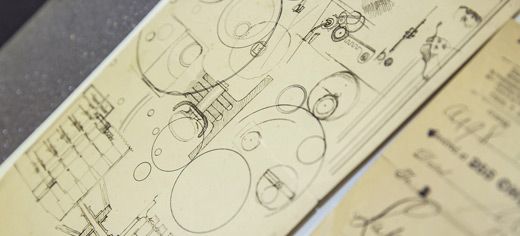
An archive of material from a pioneer of cinematography has made a transatlantic journey to the University of Leeds.
Technical drawings and letters form part of a new archive of material belonging to Louis le Prince – hailed by many as the Father of Cinematography.
The collection has found a new home in the Leeds Philosophical and Literary Society’s archives, held in the University’s Special Collections.
Trailer1 from Guerilla Films on Vimeo.
It was in Roundhay Park Gardens and on Leeds Bridge that Le Prince used a single-lens camera to film the world’s first moving pictures in 1888 – several years before other inventors, including Thomas Edison and the Lumière brothers. At the time, the Frenchman was a member of Leeds Philosophical and Literary Society.
Le Prince was never able to bring his invention to the public notice or claim credit for it – he vanished in 1890 after apparently boarding a train from Dijon to Paris. Various theories have been put forward about his disappearance, including suicide and murder, but the true story remains a mystery.
After Le Prince’s disappearance, Thomas Edison claimed credit for the invention of the cinematography. Although the claim was successfully disputed by le Prince’s family, his achievements have nevertheless been largely unrecognised.
Laurie Snyder, Le Prince’s great-great-granddaughter, visited Special Collections at the University, bringing his remaining archive to Leeds from her home in Memphis, USA.
The acquisition was made at the suggestion of Leeds-born filmmaker and le Prince expert David Wilkinson, and coincided with the release of his documentary about le Prince’s life – The First Film.
Laurie, who works for the University of Memphis, said: “I’ve worked in museums for years and understand archives, so I knew these materials needed to be somewhere where they’d be accessible to people who want to research le Prince.
“I really hope that the film will spark an interest in him and that people will take a fresh look at the materials in his archive. The drawings showing the mechanisms of the camera, for instance; I’m sure that someone with an understanding of technology may see something about his process that no-one else has interpreted before.”
Professor Joyce Hill, Philosophical and Literary Society President, accepted the donation of the archive on behalf of the society at an event in the University’s Brotherton Library.
She said: “We’re absolutely delighted that Laurie agreed to give us this archive and are thrilled that Special Collections share our excitement. These unique materials will form part of the Society’s larger archive, which is kept here at the University. It means they will be publicly available under appropriately controlled conditions.
“Together with Special Collections, we are also hoping to digitise le Prince’s archive collection to bring it to an even wider audience.”
The First Film received a gala showing at the Hyde Park Picture House in Leeds on July 1; the documentary is now on general release and is featuring in several European film festivals this year. For details and to view the film trailer, see www.thefirstfilm.co.uk
For information about the Leeds Philosophical and Literary Society, one of the oldest civic societies in Leeds, see www.leedsphilandlit.org.uk
Further information
For interviews, contact University of Leeds press officer Gareth Dant on 0113 343 3996 or g.j.dant@leeds.ac.uk.
Special Collections
The University boasts one of the finest collections of rare books and manuscripts in the world in its Special Collections, housed in the Brotherton Library. It is the only library to have five of its Special Collections awarded Designated Status – recognised as collections of outstanding international importance – by the Arts Council.
The breadth of the subjects is exceptional, from exquisite photographs of pre-revolutionary Russia to books dating from the beginning of printing, as well as the archives of some of the 20th century’s most influential poets and writers, and much more.